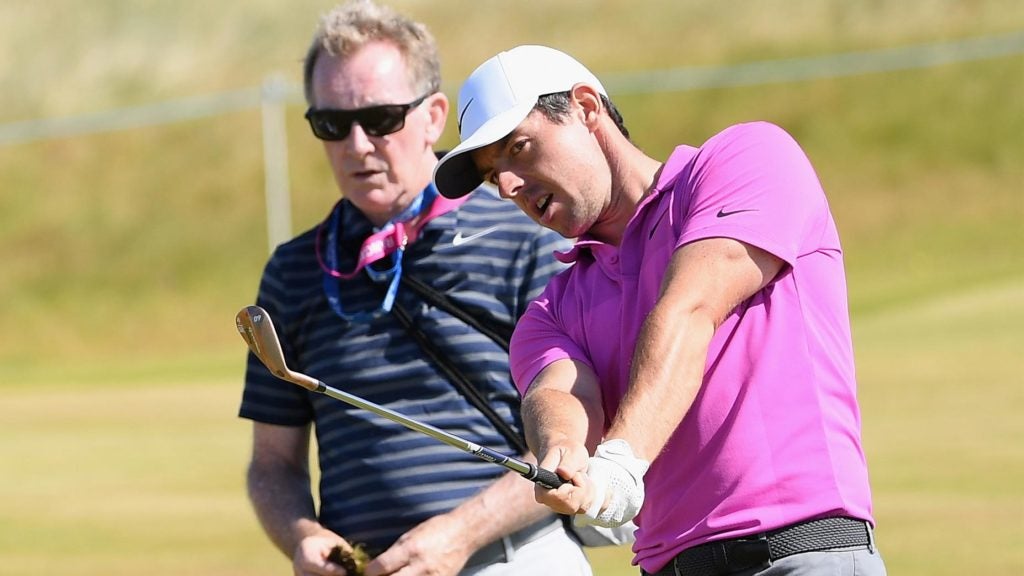In the professional golf world, the question of whether two adults are in a full-on player-coach relationship can often be a matter of some dispute. Are they just talking? In an open exchange of ideas? Full-on working together?
Enter Rory McIlroy and his cadre of game improvers, whose number and nature have come under some scrutiny. Months ago, there was McIlroy’s declaration that lifelong coach Michael Bannon would shift to a background role, while he would seek the counsel of Tour whisperer Pete Cowen on a week-to-week basis. Then there was last week’s report from Golfweek under an eye-popping headline: “Rory McIlroy splits with Pete Cowen, returns to longtime swing instructor.” The language was slightly softer in the article itself, with McIlroy declaring via text that he’d âalways had a relationship with Pete and Iâll ask for his input if I feel I need it.â
But Cowen took issue with that characterization to Golf Digest. âThat is not the deal I have done with Rory. And I only did the deal on Friday of last week,â Cowen told Digestâs Daniel Rapaport via text.
Got all that? These are complex relationships. Those involved are venting to friends via text. There’s some seemingly contradictory information. All good fun, from a distance. But coaching limbo is probably not the ideal incubator for game improvement, and explaining complex relationships to the media doesn’t sound like much fun, so when McIlroy took to the microphone on Tuesday at the DP World Championship, he sought to clear things up. Ready?
“It’s like â Michael has always been my coach,” McIlroy said. “He’s coached me since I was 8 years old. He’s also been there, even if he wasn’t visible, he’s been in the background for the last six months, and I think Michael knows my swing and my game better than I probably know it at this point.
“So I just thought with the struggles that I had, especially at the Ryder Cup, it’s funny, I talked to him at length after the Ryder Cup, and we had organized for him to come out the week after Vegas to start working again, and obviously I went and won [The CJ Cup] in Vegas.
“But those two weeks in between the Ryder Cup and Vegas I feel like I figured a few things out on my own. Which sometimes you need to do. Sometimes you need to go and throw hundreds of balls down on the range and hit some and figure it out on your own.
“And I feel like I did that. I’m not saying that I don’t need any help ever again and I’ve got figured it out, but I talked about it in Vegas, just about being myself and not trying to do anything that other people do or what I can’t do.
“So I sort of tried to figure it out myself. And I guess I went to Vegas with a little more self-belief and I won that tournament, and that gave me even more confidence. And then if anything, Michael is more of a sounding board at this point. I say to him this is what I’m trying to do. Tell me if I’m completely not right.”
This is part of McIlroy’s ongoing quest to get back to golf essentialism, which means playing the best possible version of his own golf game rather than trying to chase some other ideal. “Being me is good,” he said succinctly after that latest victory. It makes sense that his lifelong swing coach would be a part of that process. But McIlroy made it clear that he hasn’t lost Cowen’s number, either.
“As I said last week, I’ve always had a relationship with Pete, I’ve known Pete since I was 13 years old from the Irish setup, and if I want to ask his opinion on something, I can still do that. If I feel like I need his input, I’ll ask for it. As of right now, I’m happy with the setup that I’ve basically always had, and I’m excited for the road ahead.”
McIlroy also hinted at some specific swing thoughts that have been working for him â including an increased focus on visualization rather than swing mechanics.
“I think when you become quite consumed with technique, you start to lose â I’m very visual person, I visualize things, and I think I sort of got out of that mindset,” he said. “I looked at ball, I looked at target, and I tried to make a swing to have the ball go to that target, but I wasn’t seeing what I wanted to do with the ball.
“So those two weeks after the Ryder Cup, basically every shot I hit, it’s very easy to on the range to hit a ball, hit another one, every ball I was very disciplined, I stood back, visualized what I wanted to do with that shot, tried to be what I was trying to do and just let my body react to what I see.
“So that was very important to me…Being more visual, seeing more shots, seeing trajectories, seeing shapes. That’s what I’ve always done really, really well. And I got away from that, and I needed to try to get back to doing that more.”
As ever, McIlroy is a tour champion when it comes to command of the English language. It all sounds particularly clear when he says it. Whether that clarity can translate to on-course performance is something we’ll get a couple more samples of this calendar season â in Dubai this week and in the Bahamas the week after next â before it’s the holiday season, and then it’s 2022, and McIlroy is back, searching for something a little bit better.
